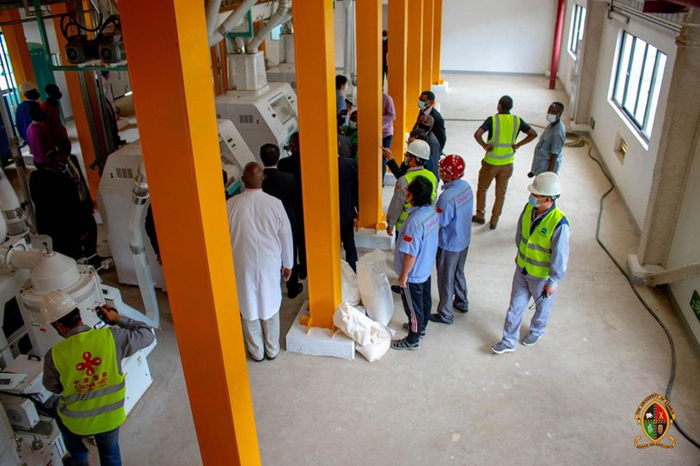|
||||||||||
| Home Nation World Business Opinion Lifestyle ChinAfrica Multimedia Columnists Documents Special Reports |
|
||||||||||
| Home Nation World Business Opinion Lifestyle ChinAfrica Multimedia Columnists Documents Special Reports |
| ChinAfrica |
| Milling Goes Hi-Tech |
| Chinese-aided food processing plant in Zambia bolsters food availability, facilitates technology transfer |
| Reporting from Zambia Derrick Silimina 丨VOL. 14 September 2022 ·2022-08-29 |

The UNZA milling sales outlet at the main campus in Lusaka (DERRICK SILIMINA)
Maize meal continues to be hugely popular across much of Southern and East Africa. In Africa, some people even say they have not eaten unless they have had maize meal, commonly known as nshima in Zambia, nsima in Malawi, sadza in Zimbabwe, papa or pap in South Africa and Lesotho, and ugali in Kenya. Many eat it twice or three times a day.
According to a report titled Africa Maize Market - Growth, Trends, COVID-19 Impact, and Forecasts (2022-27), the continent consumes 30 percent of the maize produced in the world, with Sub-Saharan Africa alone accounting for 21 percent of the consumption.
The application of advanced technology in milling plants is vital to ensure the availability of affordable maize products on the continent.
The University of Zambia (UNZA) recently launched the production of mealie meals using its state-of-the-art milling plant financed by the Chinese Government. The UNZA management revealed that the milling plant project will serve two purposes: development of academic programs in milling science, which is offered only by South Africa and Kenya in the region, as well as the processing of maize into maize products for income generation.
Affordable meals
“Having a mealie meal sales outlet within the UNZA is a well-thought-out initiative because it is making affordable mealie meal products available to most of us students on campus. It’s also a welcome move as it will expand our research horizon!” Monica Chomba, a second-year student in the School of Engineering, told ChinAfrica.
In 2017, the Zambian Government decided to allocate the Chinese-funded plant to the university under the Presidential Milling Initiative. Two other plants are situated in Mpika in the northern part of the country and Monze in the south. The three plants are a result of an agreement signed by the leaders of the two countries when former President Edgar Lungu visited China in 2015.
“Once the milling science is introduced, I would love to study for my master’s degree all aspects of the grain processing industry, from grain harvest to specialty milling with an emphasis on the science and technology of flour milling,” said Mbuyoti Akakulubelwa, a third-year student in the School of Natural Sciences.
The university has since opened a sales outlet at its campus in Lusaka, Zambia’s capital, to sell mealie meals and other grain products as well as engage in the production of maize bran.
Compared to the local retail price of K150 ($9.25) per 25-kg bag of mealie meal, the Chinese-funded mill is currently producing breakfast mealie meal at a cheaper price of K135 ($8.32) per 25-kg bag, roller mealie meal for K100 ($6.16) per 25-kg bag, and maize bran at K2 ($0.12) per kg. The plant has a capacity to produce 40 tons of mealie meal per day.
Daniel Simate, a Lusaka-based retailer of mealie meal, is optimistic that the UNZA milling plant will help bring down the prices of grain products sold by other local milling firms.
“Since the UNZA sales outlet is the cheapest in the town, many other millers’ sales outlets will be forced to come up with competitive prices for mealie meal, corn flour and other grain products,” said Simate, who owns a grocery shop in Munali Township.
UNZA’s previous Vice Chancellor Luke Mumba indicated that China’s assistance on the milling plant would have spillover benefits for people living nearby as it would create employment, provide a ready market for farmers, improve the quality of livelihood of the surrounding communities and become a steady source of tax income for the government.

Zambia’s biggest public learning institution - the University of Zambia - launches the production of mealie meals using its stateof- the-art milling plant financed by the Chinese Government
Skills development
In addition to over 1,000 solar-powered milling plants that have been installed in various parts of the Zambia since 2015, the milling facility at the UNZA is unique in the sense that it is expected to enhance skills development among students at the Great East Road Campus.
According to education experts, a career in milling science and management offers great opportunities as demand for milling products remains high in the country.
Moffat Goma, a local academician, says with a degree in milling science, graduates can choose to pursue a career in production or enter research and development, and quality control fields.
“If this course is introduced at the UNZA, it will offer both job and academic opportunities that will go a long way in enhancing our research capabilities in grain production and value chain. Key areas within milling science include utilizing the department’s grain-grading laboratory, cereal chemistry laboratories and dough-testing laboratories, among others,” Goma stated.
During a recent meeting with UNZA’s Acting Vice Chancellor Anne Sikwibele, Chinese Ambassador to Zambia Du Xiaohui emphasized that the embassy is willing to take the implementation of the nine programs of Sino-African cooperation proposed by Chinese President Xi Jinping as an opportunity to help Zambia cultivate outstanding talents in various fields by co-establishing Confucius Institutes, providing scholarships, conducting various training programs, and assisting in the unlocking of human resources and socioeconomic development of Zambia.
“China is willing to further strengthen exchanges and cooperation between the two countries in education, promote career development of the youth, lay a solid foundation for the development of Zambia, and help achieve an all-dimensional leap in China-Zambia all-weather friendship,” Du said.
Sikwibele thanked China for its support and hoped to deepen cooperation with the embassy to promote educational and cultural exchanges between Zambia and China.
“We are grateful to the government for giving us the privilege to manage the smaller plant in Lusaka which is situated on the Liempe Farm of the UNZA,” said Mumba during the launch of UNZA’s first milling plant sales outlet at the Great East Road Campus.
|
||
| About Us | Contact Us | Advertise with Us | Subscribe |
| Copyright Beijing Review All rights reserved 京ICP备08005356号-5 京公网安备110102005860号 |